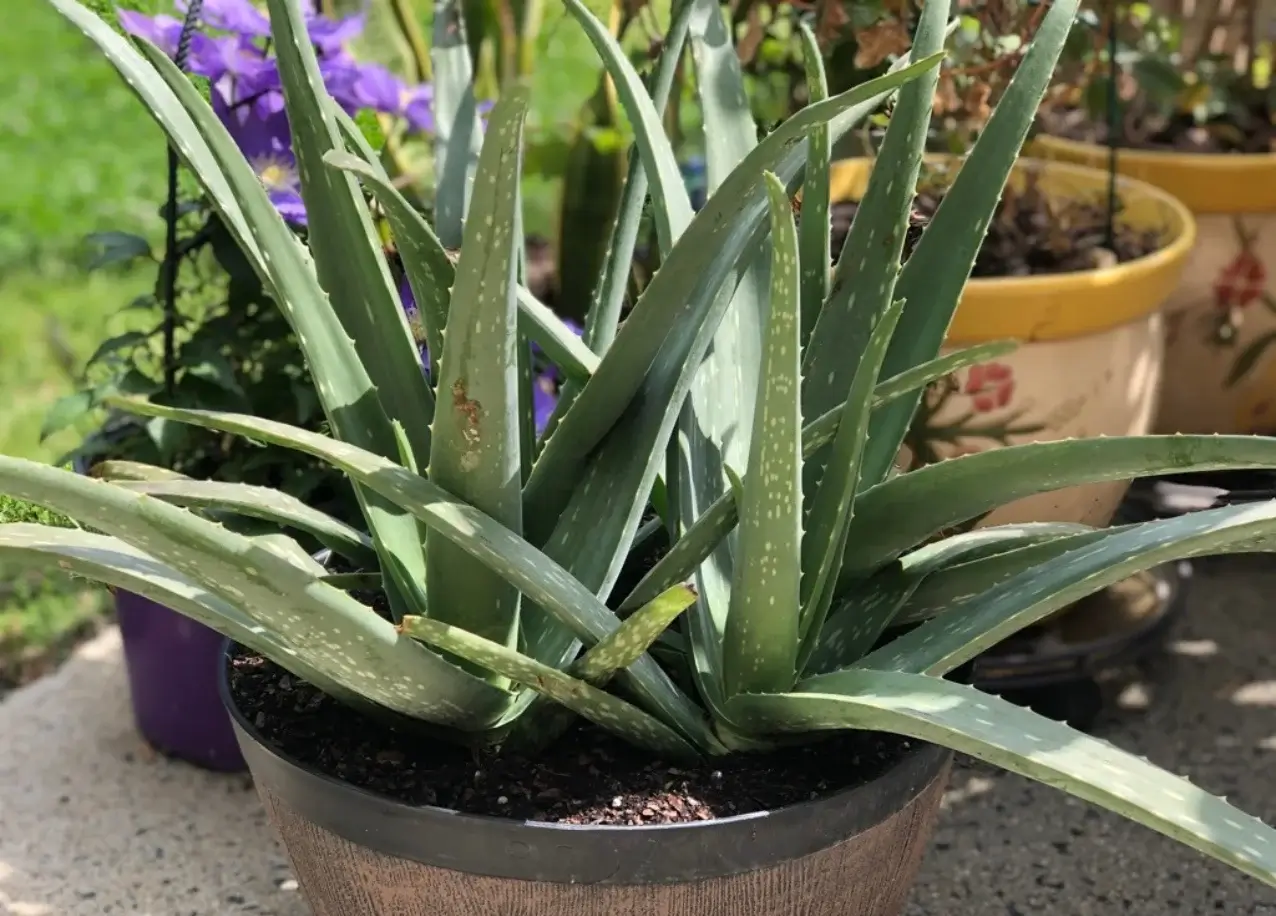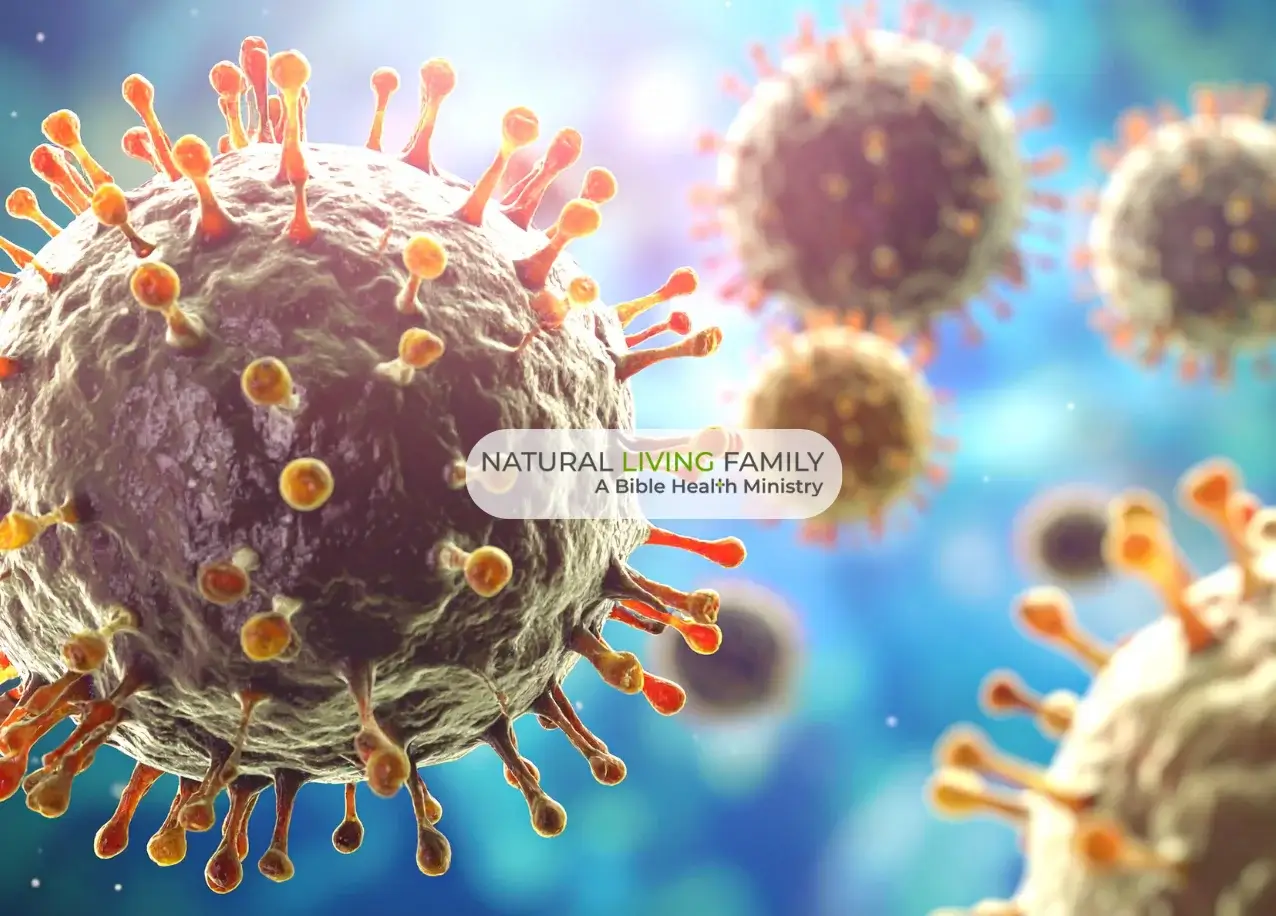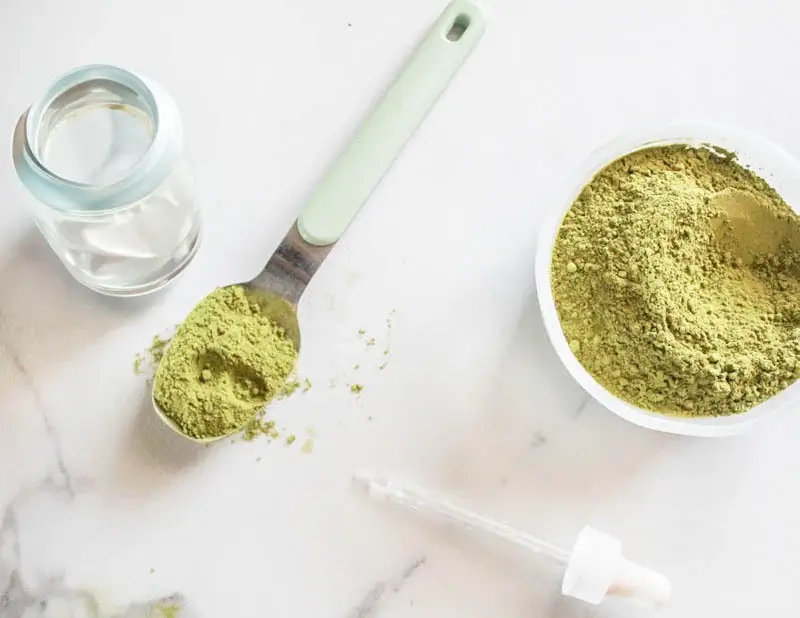Have you tried using one of God’s most versatile plants so you can enjoy aloe vera benefits from your own home? The green, gel-filled leaves of aloe plants (Aloe barbadensis) have supported health as part of traditional and alternative medicine for thousands of years. But clinical evidence and research proves this plant has a lot to offer us.
From soothing sunburns to supporting digestion and immune strength, this spiky succulent offers gentle, powerful support for your whole family. Whether you grow it on your windowsill or keep a bottle of the gel on hand, it belongs in every natural living home.
Table of Contents
What Is Aloe Vera?
Aloe plant (Aloe barbadensis Miller) is a succulent native to North Africa that has been used for centuries in traditional medicine across various cultures, including Chinese, Indian, and Middle Eastern healing systems. Its leaves contain three primary layers: a protective outer rind, a bitter yellow latex layer containing compounds like aloin with strong laxative effects, and the inner clear gel that provides most of its well-known benefits.
Aloe gel is rich in vitamins A, C, E, and B12, essential minerals like calcium, zinc, selenium, and magnesium, amino acids, and unique polysaccharides such as acemannan. These active compounds give aloe vera its moisturizing, anti-inflammatory, antibacterial, and antioxidant properties. Aloe is widely available in forms such as aloe vera gel, aloe vera juice, topical creams, supplements, and even as part of natural oral care and hair care products.
Health Benefits of Aloe Vera
Modern research continues to validate what traditional cultures have known for centuries: Aloe vera is a medicinal plant with clinical evidence supporting a wide range of studied uses. Rich in antioxidants, polysaccharides like acemannan, and essential nutrients including vitamins A, C, and E, aloe supports multiple systems in the body.
Whether applied topically or used internally in properly prepared juices and gels, aloe vera has been linked to improved skin health, better blood sugar control, reduced inflammation, digestive health, and more. Below, you’ll find evidence-backed ways this powerful plant can support your health naturally.
1. Skin Healing and First Aid
Aloe vera is perhaps best known for its soothing effect on sunburns, minor burns and other skin conditions. Its cooling, anti-inflammatory properties help reduce redness and pain while deeply hydrating damaged skin. The gel also supports wound healing by promoting circulation and stimulating collagen content production, which may speed up recovery.
Clinical trials have confirmed aloe’s ability to improve skin elasticity, increase collagen synthesis, and aid recovery from conditions like radiation dermatitis and contact dermatitis. Because of its natural antibacterial and anti-inflammatory properties, aloe is also used to calm acne, skin rashes, and mild cases of eczema or psoriasis. It’s gentle enough for the whole family in helping ease bug bites, diaper rash, and everyday cuts and scrapes.
2. Digestive Support and Gut Health
Aloe vera supports digestive health in a variety of ways. The latex portion of the leaf contains aloin, a natural anthraquinone-based laxative traditionally used to relieve occasional constipation. While effective, aloe vera latex should be used sparingly and with guidance due to its potential to cause cramps or electrolyte imbalances.
The gel, on the other hand, may help soothe inflammation in the gastrointestinal tract, balance gut flora, and reduce symptoms of irritable bowel syndrome (IBS). Early research also suggests that oral use of aloe vera gel may improve symptoms of acid reflux and gastroesophageal reflux disease (GERD), though more clinical studies are needed. Aloe vera juice is commonly consumed to soothe the digestive tract, alleviate occasional constipation, and reduce bloating.
3. Immune Boost and Antioxidant Power
Aloe vera is rich in antioxidants, which help protect the body from oxidative stress, which is a key contributor to chronic disease and aging. It contains polyphenols, flavonoids, as well as vitamins C and E. These nutrients support cellular health and reduce inflammation.
Additionally, aloe’s antibacterial and antiviral compounds may help defend against common infections and support the body’s natural immune response. Some studies have shown aloe vera to be helpful in managing inflammatory responses by modulating the cyclooxygenase pathway and reducing levels of prostaglandin E2.
4. Blood Sugar and Cholesterol Balance
Growing evidence supports aloe vera’s ability to improve metabolic health. Clinical studies have found that oral supplementation with aloe vera juice or extract may reduce fasting blood glucose levels in people with type 2 diabetes and prediabetes.
In a double-blind, randomized controlled trial, lipid profiles were improved by aloe supplementation. Results showed lowered LDL cholesterol and triglycerides, and increased HDL cholesterol. This may be due to aloe’s active components enhancing insulin sensitivity and reducing systemic inflammation. Both those factors are key in managing metabolic syndrome.
5. Oral Health and Dental Hygiene
Used as a natural mouth rinse, aloe vera gel can reduce plaque buildup and soothe inflamed gums. Its antibacterial properties make it an effective and gentle alternative to chemical-laden mouthwashes. Studies have shown that aloe may help inhibit the growth of Streptococcus mutans and Candida albicans, both of which are common contributors to oral infections. Aloe vera has also shown promise in managing oral submucous fibrosis and mouth ulcers, especially in individuals undergoing radiotherapy.
6. Hydration and Nutrient Boost
Aloe vera juice is a low-calorie, low-sugar beverage that helps support hydration and delivers vital micronutrients like folic acid, vitamin C, and B vitamins. These nutrients play important roles in skin repair, immune support, and energy production. Aloe vera juice also provides enzymes and trace minerals that may aid digestion and support overall wellness. Just be sure to choose products labeled as “decolorized” or “purified” to ensure the aloe latex has been removed for safety.
Family and Home Uses for Aloe Vera
Aloe vera isn’t just for major health concerns. This is an ingredient in many DIYs that make it a go-to for daily life. Here are some natural ways we use aloe in our home:
After-Sun Spray for Cooling Relief – Blend aloe vera gel with unscented witch hazel and essential oils like lavender and peppermint to create a soothing spray. It hydrates, cools, and helps restore sun-kissed skin naturally.
Anti-Aging Healing Skin Serum – Mama Z’s homemade blend combines aloe vera gel with coconut oil and lavender to nourish and heal. Use it as a topical gel or serum for dry patches, irritation, or simply as a natural skin-loving moisturizer.
Foaming Hand Soap – A family-safe cleanser made with castile soap, aloe, and essential oils to clean hands without drying them out. Perfect for frequent use, especially in seasons of sickness.
DIY Hair Detangler Spray – An all-natural version with non-toxic ingredients combine for a detangler that softens strands and reduces breakage-great for kids and grown-ups.
Aloe Popsicles and Smoothie Boosts – Add aloe gel to fruit juice for refreshing, hydrating popsicles, or blend into smoothies for an extra nutrient kick. Always remove the yellowy aloe latex and use gel only.
Sustainable Living: Grow Your Own Aloe
Aloe vera thrives indoors and requires little maintenance. Keep a plant in your kitchen window or garden so you always have a fresh, renewable supply of natural healing. They are easy to grow as long as you keep them in well-draining containers and can grow large enough to divide and share with other gardeners. We love them in our home container garden collection.
How to Use Aloe Vera Safely
Aloe vera is generally safe for everyday use, but as with any medicinal use herb, there are a few important guidelines to follow to make sure you and your family benefit from it without any unwanted side effects.
- Topical use is safe for most people, but always patch test on sensitive skin (especially children).
- Internal use should be limited to decolorized aloe gel or juice. Avoid oral use of whole leaf or latex products unless supervised by a healthcare provider.
- Watch interactions of aloe products with diabetes medications and consult your health care provider if pregnant or nursing.
Aloe vera is more than just a houseplant. It’s a living reminder of God’s provision and design. From healing wounds to hydrating your body, this simple plant supports your health naturally, sustainably, and gently. As Psalm 104:14 reminds us, “He causes the grass to grow for the cattle, and vegetation for the labor of man, so that he may bring forth food from the earth.”
Keep aloe vera in your home, and let this humble green gift become a daily part of your natural living journey.
-
- https://www.ncbi.nlm.nih.gov/books/NBK92765/
- PMID: 27507917
- https://www.nccih.nih.gov/health/aloe-vera
- PMID: 19882025
- PMID: 25883909
- PMID: 32924222
- PMID: 32183224
- PMID: 10885091
- PMID: 38998660
- PMID: 15043514











